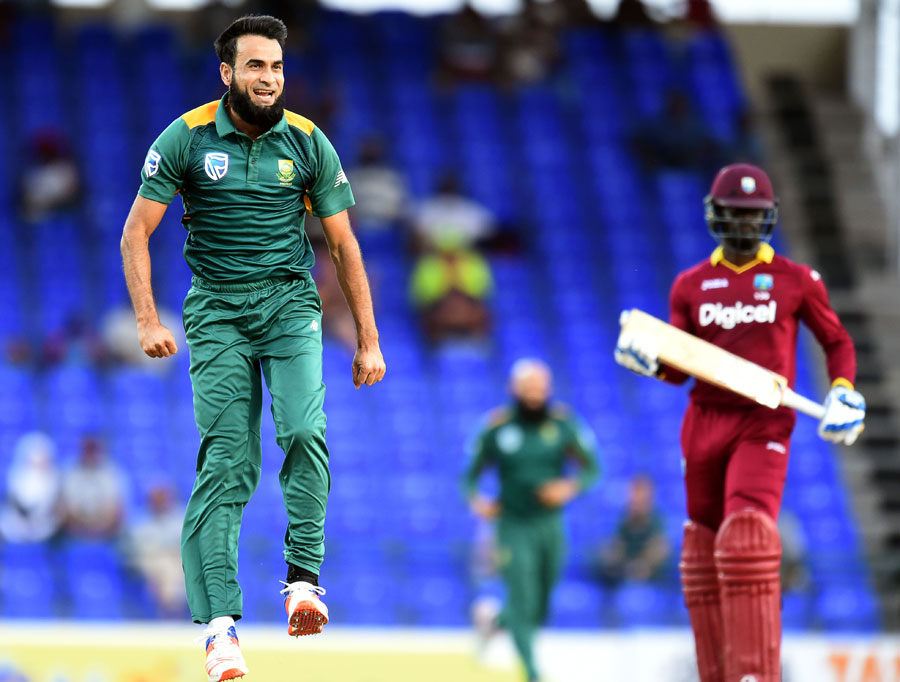A Hashim Amla century and an Imran Tahir seven-for inspired the Proteas to a 139-run victory over West Indies.
It was a clinical display from the Proteas that saw them take the bonus point, and with that, top spot on the Tri-Nation series standings.
While the bowling hasn’t been much of an issue for the Proteas throughout the series, the batting has let them down, but this was a far more assured and well-measured display from the top order, with three batsmen scoring more than 70 runs, including Amla, who raced to a 23rd ODI ton.
The bowling was a bit erratic at first, but that all changed when spin was introduced, and it was a night for Tahir to remember. Not only was his 7-45 career-best figures and best figures by a South African in ODIs (surpassing Kagiso Rabada’s 6-16 against Bangladesh), but he also became the fastest South African and fourth-fastest of all time to reach 100 ODI wickets, doing it one match quicker than Morne Morkel’s 59.
The platform was laid early on as the Proteas were asked to bat first in what was a crucial clash at Warner Park in order to join West Indies and Australia on two wins apiece. Amla and Quinton de Kock put on 182 for the opening stand, never straying from the six runs an over mark.
The biggest concern going into the match was whether or not they were going to be able to contain mystery spinner Sunil Narine, but they saw him off with relative ease, as he completed 10 wicketless overs for 46 runs. The pacemen were dealt with fairly easy, with the go-to balls for the Windies being the slower ones operated by Kieron Pollard and Carlos Brathwaite, in which three of the four wickets were taken.
Not only were the Proteas clinical with their display, but they were experimental, too. Chris Morris, returning from a hamstring niggle after a two-match absence, was bumped up to No 3 in the order. It paid off as he scored 40 runs off just 25 balls to give the side a bit of momentum during a slightly slower period towards the end of the innings. Some exquisite ramp shots from both Amla and Du Plessis added to the exhibition.
Morris came in for Amla, who skied one for a 99-ball 110, while De Kock fell the next over for 71. Faf du Plessis came in at No 4, prompting questions from the commentary team as to why the No 1 batsman in the world AB de Villiers was being used so sparingly. In the end they did pretty well with his limited services. He scored 27 off 19 balls, but his 64-run partnership with Du Plessis (73 not out) lifted them from a good score to an excellent one of 343-4.
Johnson Charles and Andre Fletcher, as they did in their win against Australia on Monday, got their side off to a flier, as Kagiso Rabada and Wayne Parnell failed to maintain discipline with their lengths. They raced to 69 inside nine overs before Tahir struck in his second over, thanks to a fine diving catch in the deep from Farhaan Behardien.
If there were any concerns that Tahir and Tabraiz Shamsi were going to be too attacking to combine together, then they put that to bed as the Windies top order couldn’t pick their variations. Shamsi is going to be difficult to drop for the next game as he proved a constant threat. His first wicket saw Charles walk back for 49, before Wayne Parnell produced a peach of a delivery to skittle Darren Bravo for 11.
It was always going to be a tough time for the hosts. After all, their best chase in ODIs is 300, a feat they achieved in 2004 against SA in Centurion. As the required run rate increased, so too did their nerves at the crease. The 34th over proved to be the one that separated the men from the boys, as Tahir took three wickets in it, the third of which brought up his second five-wicket haul in ODIs.
The 37-year-old is a veritable journeyman, but never before had he taken more than five wickets in a List-A innings. It didn’t take him long to get his sixth and seventh wicket on the night, to wrap up the innings, and with that, a victory that gives the Proteas a new air of confidence going into their final two matches, as they aim to book their spot in the final in Barbados on 26 June.
Picture: AFP







